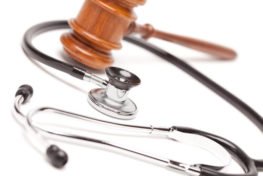Medical Malpractice Basics and FAQs

There are many things that a person must contemplate after his or her life has been drastically changed by medical malpractice, which may take many forms. A doctor, nurse, pharmacist, or other medical professional may commit malpractice in many different ways, some of which may lead to minimal harm, while others can lead to a lifetime of suffering or even death. Whether a person was injured when a doctor failed to diagnose a serious illness or a pharmacist provided the wrong pills to a patient, there are many things to consider when determining if pursuing a legal case is the right path.
One of the first things that a person often wonders about is what types of mistakes fall into the category of medical malpractice. While the acts or omissions of a negligent doctor or other medical professional vary extensively
Common types of medical negligence
- Failure to render the proper treatment for a medical condition;
- Failure to diagnose a medical condition or delaying a diagnosis to the point where additional harm is done;
- Failure to respond to an emergency situation with the proper course of treatment;
- Wrong-site surgery;
- Failure to provide proper care during pregnancy or labor;
- Failure to provide sufficient information for the patient to consent to the proceeding or treatment with knowledge of the risks and side-effects, as well as an understanding of reasonable alternatives that might exist;
- Failure to prescribe the right medication or failure to prescribe the medication in the proper dose; and
- Failure to fill a prescription properly.
In addition to understanding the nature of acts or omissions that qualify as medical malpractice, it also is crucial to know how to prove that medical malpractice occurred.
Fulfilling the Basic Requirements to Sustain a Medical Malpractice Action
In a negligence action, it is necessary to present evidence to demonstrate the following:
Establishing a Professional Relationship – Duty
In order to bring a medical malpractice case, it is necessary to have a relationship with the medical professional that justified the reliance of the person who was harmed on the care that was rendered by the professional. This means that a person who talks to a doctor at a cocktail party and tells her about the ache in the general vicinity of his appendix can bring a lawsuit against the doctor after his appendix ruptures when he does not seek any actual medical care. However, when a person has established a relationship with a doctor, nurse, or other medical professional, then the person must act in accordance with the standard of care established for a person with a comparable level of training and experienced. Many times, a doctor will argue that he or she cannot be held accountable for a person’s injury because he was acting in the capacity of a consultant and did not have an actual relationship with the person who was harmed.
Demonstrating Negligence – Breach
There are many situations that might lead to harm or a less than optimal outcome where the doctor did not act negligently. It is necessary to prove that the doctor or other medical professional actually acted in a manner that diverges from the treatment that another professional with the similar educational background, specialization, and experience would have provided and this resulted in quantifiable harm. The analysis often revolves around whether or not the medical professional acted in a reasonable manner, often expressed as competency. In almost every case, negligence only can be demonstrated through the testimony of a medical expert. It requires a skilled attorney to present the right expert testimony in order to prove the critical element of negligence.
Connecting the Negligence to an Actual Injury – Direct and Proximate Cause
A doctor or other medical professional may have made a mistake, but it must be demonstrated that the error resulted in a quantifiable injury. This is a critical component of the elements of negligence. It will be necessary to have expert testimony to prove that the actions or omissions of the doctor were more likely than not to have caused the injury. For example, a person who went to a doctor to receive medical care during a pregnancy may develop an infection during the pregnancy. Although that infection may have resulted in some harm even if diagnosed and treated promptly, if the doctor failed to diagnose the medical condition in a timely manner and the infection became severe, leading to harm to the baby, then the doctor is liable for the additional harm caused by the failure to diagnose the condition.
The Injury was Quantifiable – Actual Injury
There needs to be a clear way to place a value on the injuries that were sustained as the result of the defendant’s negligence. This may include the presentation of medical bills, the valuation of physical pain and emotional trauma, and a showing of other costs, including accommodations and assistance, which are directly linked to the injury.
Stern Law, PLLC Advocates for Medical Malpractice Victims
There are many nuances involved in developing and presenting a successful medical malpractice case. At Stern Law, PLLC, we have the experience and resources to help our clients obtain the results necessary to adjust to life after medical malpractice. For more than 30 years, we have fought hard to attain compensation so that our clients can pay bills and receive proper ongoing medical care. In addition to skilled representation of our clients, we also strive to act as a resource to everyone who may have been impacted by medical malpractice. We have staff available to answer questions 24 hours a day, seven days a week for anyone who has a question or concern. Call us at 1-844-808-7529 or fill out an online contact form in order to learn how we can help you get through this difficult time.













